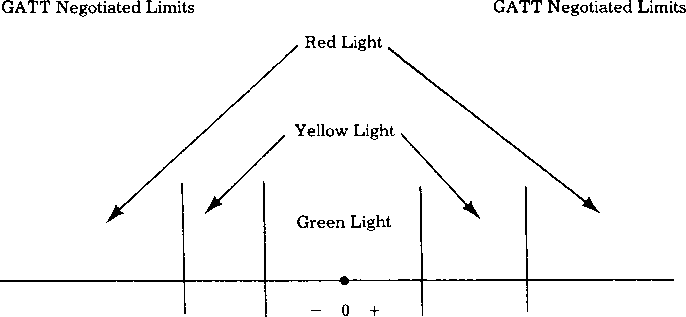Figure I. Export Distorting Policies

Export Retarding Policies
(Export taxes or restraints)
Export Promoting Policies
(Export Enhancement Programs)
Policies Rated for Phase Out
Over the remainder of the Uruguay Round, the attempt will be to
define and to set GATT-negotiated limits for each country on those
policies that are definitely slated for elimination, preferably as soon
as possible (“Red Light” policies); those that may remain in place in
the short run, but are to be modified and reformed during a transi-
tion phase (“Yellow Light” policies); and those that are sufficiently
nondistorting to remain in place indefinitely (“Green Light”
policies).
Import Distorting Policies
Similarly, with respect to imports, a policy has a distorting trade
effect if either buyers or sellers in the domestic market face different
conditions from those who participate in the cross-border market. As
shown in Figure 2, policies that retard imports, such as quotas, ex-
plicit tariffs, or health, safety and other sanitary or phytosanitary re-
strictions, are one side of such distortions. Less frequently men-
tioned are policies that artificially promote imports. An example
might be environmental regulations on fruit and vegetable produc-
tion prohibiting the use of certain cost-saving chemicals in the
United States leading to incentives to import foreign fruit and vege-
tables on which such chemicals have been used. Because domestic
growers quickly realize such regulations have this effect, calls for
import protection through health and safety standards applied
equally to foreign produce are quickly heard, converting the regula-
29
More intriguing information
1. The name is absent2. Sustainability of economic development and governance patterns in water management - an overview on the reorganisation of public utilities in Campania, Italy, under EU Framework Directive in the field of water policy (2000/60/CE)
3. Spatial patterns in intermunicipal Danish commuting
4. The name is absent
5. DIVERSITY OF RURAL PLACES - TEXAS
6. The name is absent
7. The name is absent
8. Contribution of Economics to Design of Sustainable Cattle Breeding Programs in Eastern Africa: A Choice Experiment Approach
9. The open method of co-ordination: Some remarks regarding old-age security within an enlarged European Union
10. The InnoRegio-program: a new way to promote regional innovation networks - empirical results of the complementary research -